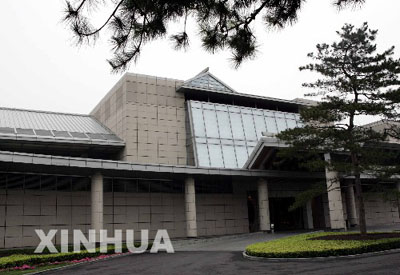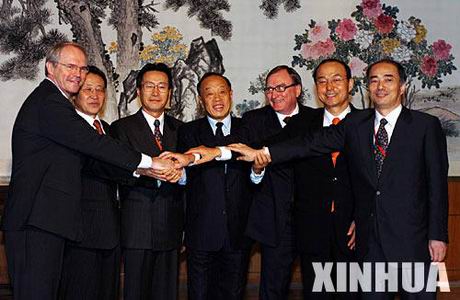
The undated photo shows the meeting place of
the new round of six-party talks at Diaoyutai State Guesthouse in
Beijing.

Chinese Foreign Minister Li Zhaoxing (C), Chinese Deputy
Foreign Minister Wu Dawei (3rd, L), also head of the China delegation, Kim
Kye-gwan (2nd, L), head of the delegation of the Democratic People's Republic of
Korea (DPRK), Christopher Hill (1st, L), head of the United States delegation,
Song Min-soon (2nd, R), head of the delegation of South Korea, Alexander
Alexeyev (3rd, R), head of the Russia delegation and Sasae Kenichiro (1st, R),
head of the Japan delegation, hold hands together at the opening ceremony of the
fourth round of the six-party talks.-Xinhua
The United States promised not to attack the Democratic People's Republic of
Korea as six-party talks on Korean nuclear issue resumed in Beijing yesterday
after a 13-month-long impasse.
US chief negotiator Christopher Hill said at
the opening session of the fourth round of the talks that the US regards the
DPRK as a sovereign state and has no intention to attack it.
He also said
that nuclear weapons will not make North Korea more secure. "On the contrary,
nuclear weapons on the Korean Peninsula will only increase tensions in the
region and threaten the integrity of the global non-proliferation regime," he
said.
Representatives from China, the United States, North Korea, South
Korea, Japan and Russia have held three previous rounds of talks in Beijing from
2003 to 2004, but failed to solve the Korean nuclear impasse.
Negotiations
offer a better chance at peace and security than building bombs, Hill said. "The
six-party talks offer a better future for North Korea."
He said that if the
DPRK decided to dismantle its nuclear program "permanently, fully, verifiably,"
the US and other parties at the talks were prepared to take corresponding
measures consistent with the principle of words for words and actions for
actions.
The head of the DPRK delegation, Kim Kye-gwan, said political will
is needed to end the threat of a nuclear war and create a Korean Peninsula free
of nuclear weapons.
The DPRK is ready for a nuclear-free Korean Peninsula, he
said, adding that his country will work hard with the other five members at the
talks to ensure they aren't fruitless.
As the representative for the host
country, Chinese Foreign Minister Li Zhaoxing urged negotiators to take a
"flexible and pragmatic" attitude to seek "positive" progress in the new round
of negotiations.
A Korean Peninsula free of nuclear weapons along with
long-term peace and stability in the region would serve the interests of all
parties concerned, Li said.
Noting there might be various difficulties during
the talks, he said, so long as all sides work together there would be
success.
"Nothing in the world is difficult for one who sets his mind on it,"
he said, quoting a Chinese saying. "China will continue to work with all sides
to realize denuclearization of the Korean Peninsula and regional peace and
stability."
The South Korean delegation urged all the negotiators to
concentrate on the nuclear issue.
"It is not ideal for the parties concerned
to distract from this target (of building a nuclear-weapons-free Korean
Peninsula) during the new round of the six-party talks," said Song Min-soon,
South Korea's delegation head.
However, Japan's chief negotiator Sasae
Kenichiro still raised the abduction issue at the opening session, saying
outstanding issues of concern such as nuclear missiles and abduction should be
resolved in a comprehensive manner.
Negotiators will continue talks today
with a plenary session planned for this morning.



